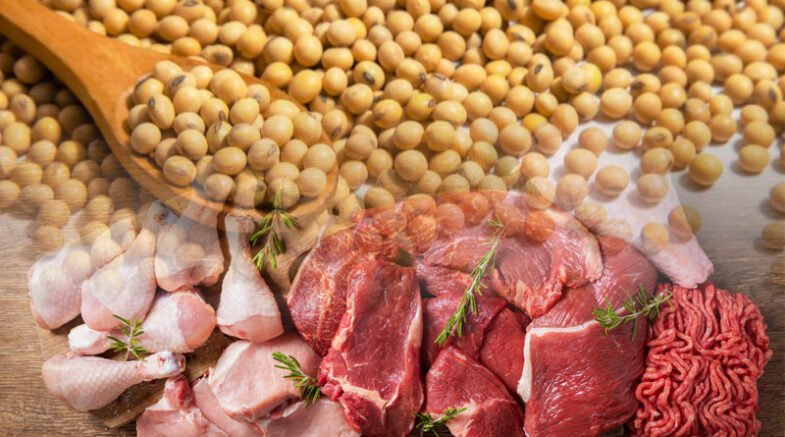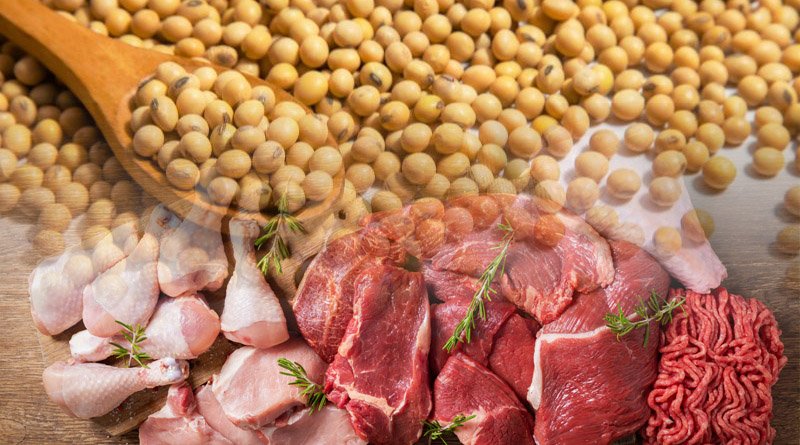Soybean is a highly versatile crop that has gained immense popularity in recent years due to its various health benefits and ability to be processed into different food products.

Soybean is a highly versatile crop that has gained immense popularity in recent years due to its various health benefits and ability to be processed into different food products. One of the most intriguing properties of soybean is its potential to serve as a “meaty” plant, offering a plant-based alternative to meat.
Soybean contains all nine essential amino acids that the human body needs and is therefore considered a complete protein source. This makes it an ideal substitute for meat, which is a traditional source of protein for many people.
Additionally, soybean is rich in fiber, vitamins, and minerals, making it a nutritious option for a balanced diet. Soybean can be processed into different forms, including tofu, tempeh, soy milk, and textured vegetable protein (TVP). TVP, in particular, is a highly processed form of soybean that has a meat-like texture and can be used as a meat substitute in a variety of dishes.
The adoption of soybean as a meaty plant has several benefits, including the potential to reduce the environmental impact of meat production and the potential to offer a healthier protein source for people looking to reduce their meat consumption.
Introduction:
Soybean, a meaty plant is a versatile plant that has been used for centuries as a source of protein in many cultures. In recent years, its popularity has grown as a meat substitute for vegetarians and vegans.
Soybean has become known as the “meaty plant” due to its high protein content and ability to mimic the texture and flavor of meat. In this article, we will explore the benefits of soybean as a meat substitute and its potential impact on our health and the environment.
Protein contents:
Soybean is an excellent source of protein. It contains all the essential amino acids that our bodies need to build and repair muscle tissue. Soy protein is also easily digestible, making it a popular choice for athletes and bodybuilders.
In fact, soy protein is one of the few plant-based proteins that is comparable to animal-based proteins in terms of its quality and quantity. A 100-gram serving of soybeans contains around 36 grams of protein, which is equivalent to the amount of protein found in a 100-gram serving of chicken breast.
Flavor and texture:
One of the reasons why soybean is such a popular meat substitute is its ability to mimic the texture and flavor of meat. When processed into products like tofu, tempeh, and seitan, soybean can be shaped and seasoned to resemble various types of meat. These meat substitutes are often used in dishes like stir-fries, sandwiches, and stews, providing a similar taste and texture to meat-based dishes.
Best for nonmeat eater:
Soybean is best for those people who do not like to eat meat. It fulfils the protein requirement of purely “Vegetarians” also best for those people who have some allergic issue from meat. While soybeans can be a good addition to a vegetarian diet to help meet protein needs, they are not necessarily a replacement for meat.
Meat contains a variety of important nutrients that are not found in soybeans, such as vitamin B12, iron, and zinc. It’s important for vegetarians to ensure they are getting adequate amounts of these nutrients through other food sources or supplements. Soybeans are a great source of plant-based protein and can be an excellent alternative to meat for non-meat eaters.
In fact, soybeans contain all of the essential amino acids that the human body needs, making them a complete protein source. Soybeans are also a good source of fiber, vitamins, and minerals, including iron, calcium, and potassium.
In terms of nutrition, soybeans are relatively low in fat compared to many types of meat. They are also a good source of healthy unsaturated fats, including omega-3 fatty acids, which are important for heart health. Soybeans are also rich in phytonutrients, including isoflavones, which have been shown to have a number of health benefits.
Some studies suggest that consuming soy products can help to lower cholesterol levels, reduce the risk of heart disease, and even reduce the risk of certain types of cancer. Overall, soybeans can be a great addition to a healthy diet, especially for those who do not consume meat.
However, it’s important to note that soy products should be consumed in moderation as part of a balanced diet, as consuming excessive amounts of soy can have negative health effects in some people.
Environmental Impact:
The production of meat has a significant impact on the environment. Meat production requires large amounts of water, land, and energy, and contributes to greenhouse gas emissions. Soybean, on the other hand, requires less water and land to produce than meat, and produces fewer greenhouse gas emissions. In fact, some studies have shown that replacing meat with soybean-based products can significantly reduce our carbon footprint.
Conclusion:
Soybean is a versatile and nutritious plant that can serve as an excellent meat substitute. It is high in protein, easily digestible, and can mimic the texture and flavor of meat.
Soybean also has several health benefits and a lower environmental impact than meat production. By incorporating soybean-based products into our diets, we can improve our health and reduce our impact on the environment.
